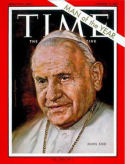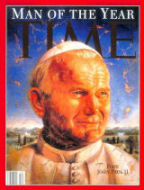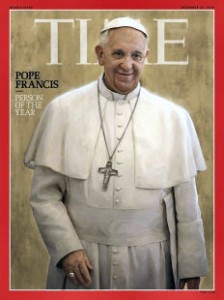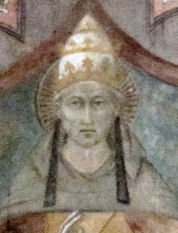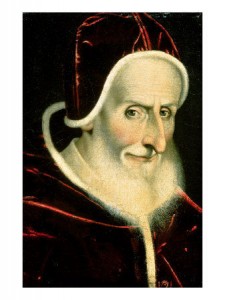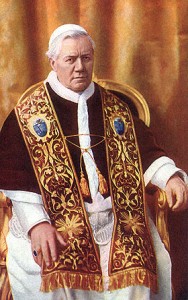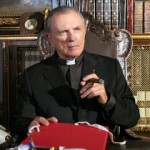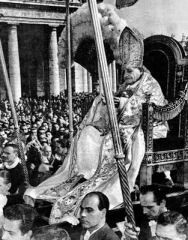Do they deserve it? Continue reading
Two popes will be canonized on Sunday, John XXIII and John Paul II. Maureen Dowd has recently written in the New York Times that there was only one halo between them, and it belonged to John XXIII. She objected to the way that John Paul handled the numerous scandals caused by abusive priests. Particularly offensive to her were the ways that he dealt with Cardinal Law and the unbelievable story of Marcial Maciel Degollado. Dowd argues that these shortcomings outweigh the good that the pope did in other areas, most especially his role in the overthrow of the Communist regimes in eastern Europe.
If you take the question seriously, and she almost certainly does, the first issue must certainly be establishing criteria for evaluating a pope’s determination that someone is worthy of canonization. The theory behind this (and much of Catholic doctrine) is entirely based on two verses in the Gospel of Matthew. The pope, as the successor to St. Peter, has the Keys to the Kingdom. If he says that someone is in heaven, then that person is there. Live with it.
It is therefore clearly heretical for Dowd to claim that Pope Francis is wrong in canonizing John Paul II. I have not read about anyone calling her a heretic, but it seems obvious to me that an article entitled “A Saint He Ain’t” puts her in the camp of Jan Hus and Giordano Bruno, and the last thing that entered their nostrils was the stench of their own burning flesh.
One could, of course, consider this from the perspective of a historian of the Church. Did these two popes do an outstanding job of promulgating the Church’s message and advancing its principles? That seems to be the approach that Dowd took, but many Catholics would think that she has it backward. To them John XXIII took the first steps on the Church’s disastrous journey to becoming a more humanistic and less dogmatic institution. John Paul II, on the other hand, stood up to the Commies and helped restore respect for the traditions and doctrines throughout the world.
There are several other ways of looking at this. The first is to compare these decisions with the canonizations of other popes. Only three popes who served since the eleventh century have been canonized, and they had almost nothing in common. It is therefore not easy to make intelligent comparisons, but I feel confident that the historical record indicates that the recent popes seem at least as saintly as the previous trio. I made that case here.
Another approach is to judge the popes by the standards of Church history. How closely Pope John Paul was involved in decisions to cover up the clerical abuse cases is not clear. I would argue that even if he personally decided to stonewall on the issue, that was consistent with Church principles and the actions of previous pontiffs.
In the first place one should bear in mind that the most basic Catholic doctrine concerns forgiveness and redemption through the sacraments. Even the most serious sins can be forgiven, and even the most incorrigible offender can be given a second chance. The most outrageous pope of all time, the first John XXIII, was, after being convicted of five serious felonies, eventually welcomed back into the Church and was even restored to the rank of cardinal. The most serious crime in the Church’s eye is not murder or rape. It is heresy because the heretic is actively recruiting others to reject the Church’s teaching. He (or in this case she) is actively trying to deceive others with the expressed intent of denying them access to the means of achieving salvation. The Inquisition was specifically convened to exterminate these people and their ideas.
So, while no pope* would condone pedophilia, a person who commits pedophilia is just an ordinary sinner. All people are sinners, and the way that the Church deals with known sinners has been consistent throughout its history. If they show contrition and have “a firm purpose of amendment,” they are forgiven. They are probably counseled to pray for sanctifying grace and to avoid “near occasions of sin.” The same rule applies to children who disrespect their parents and to serial killers and rapists like the first Pope John XXIII.
Furthermore, priests are special people. They alone have received the sacrament of Holy Orders. The Church has always preached that this confers upon them divine grace that empowers them both to administer the sacraments, the only path to redemption, and to spread the Church’s message. These men have always been considered a valuable resource that is to be husbanded.
In this context it is perfectly reasonable for Church officials to keep quiet about the foibles of one of its priests, all of whom, after all, are sinners. It is perfectly reasonable to expect the officials, assuming that the offenders repented and seemed sincere, to forgive the abusive priests and to try to help them with their problem by moving them away from temptation.
How many times should you do this before you consider them beyond the pale? The Bible says that the answer is 490 (Matthew 18:22)! I have not heard of even one priest who approached the biblical limit on forgiveness.
And what of mental illness? Aren’t the pedophiles sick? I don’t know, but this way of looking at things is not consistent with Church teachings. The fact that some people are more strongly drawn to one type of sin or another is not really germane. We all must struggle with the temptations that come our way.
Of course, the Church’s approach does not consider the rights of the victims. From its perspective, however, we are all mistreated in one way or another. Our job is to “offer it up,” forgive the sinner, and to try to use the experience as a way to increase our own resolve. I don’t remember anything in the catechism about hiring a lawyer to sue the Church for millions of dollars.
* Well, maybe one. Pope Julius III had a very strange relationship with an adolescent ironically named Innocenzo.


